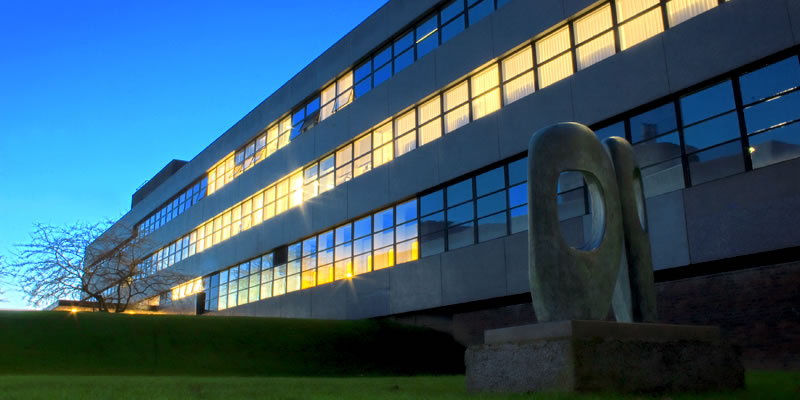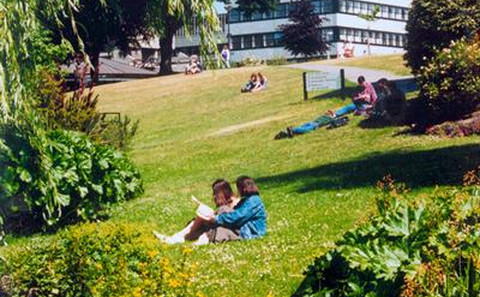For the first three years of the degree you’ll follow the MPhys Physics programme, gaining a thorough training in physics theory and practice. You’ll apply for your industrial placement during the third year, selecting from projects that span a wide range of sectors and research areas. Your industrial placement will start after your third-year exams and run until December, after which you’ll write up your project results and continue with your final MPhys Physics modules.
Past projects have involved:
- developing new ways of assessing optical coatings for fibres
- looking at the transmission of acoustic waves through materials
- investigating the use of machine learning for identifying radioactive isotopes
As well as experiencing industry R&D first hand, you’ll develop essential professional skills, for example by presenting to staff at different levels of the business, designing and budgeting for your experiments and liaising with customers.
When it comes to choosing and applying for your industrial placement, we’ll give you plenty of support. Companies make their selection via CV and interview, so it’s great practice for future job hunting. If none of the projects on offer match your research interests, we’ll do everything we can to find you one that does. And you don’t have to commit to joining this programme until you have secured a placement that suits you – should you decide not to go ahead you’ll continue with the MPhys Physics degree.
If you undertake a summer placement through the South East Physics Network scheme, and find that you’re really enjoying it, you may be able to convert it into a six-month placement.
You’ll be well supported during your placement too, with day-to-day guidance from a supervisor in your placement company and visits from the programme leader, who is available throughout the six months should you need to get in touch.
View the 2019/20 programme specification document for this course
View the 2020/21 programme specification document for this course
Outstanding resources for learning and enterprise
You’ll use state-of-the-art equipment in our teaching laboratories, with expert technicians on hand to support your experimental work. Our specialist facilities also include a photonics lab with the latest laser equipment, one of the world’s most powerful supercomputers and a £120m clean room for fabrication at the atomic level.
The University of Southampton is a hub for enterprise and innovation – indeed, some of our industrial placement partners are University spin-out companies – so it’s a great place to develop your entrepreneurial skills. If you’re interested in setting up your own commercial venture, our Future Worlds start-up incubator offers mentoring and support to help your fledgling business thrive. It can help you connect with expert industry mentors and investors, and runs events including ‘dragon’s den’ funding competitions.
A top-five research department
Join one of the top five Russell Group departments for physics and astronomy research (REF 2014). Our reputation for research excellence builds on a track record of discovery, and we remain on the frontline of new developments. For example, Southampton physicists were instrumental in the development of erbium-doped amplifiers that make today’s internet possible, and recently our scientists were involved in detecting gravitational waves and light from the collision of two neutron stars for the first time.
Your studies will be enhanced by our research expertise in areas such as photonics, astronomy, particle physics and quantum mechanics. We regularly update our modules based on new findings and your lecturers will bring you news of the latest advances – often before they are published in the media.
Accreditation
Our MPhys Physics programmes are accredited by the Institute of Physics
Programme Structure
Year one includes an introduction to special relativity and the foundational theories of quantum physics and electromagnetism. You’ll gain more in-depth knowledge as you progress, applying your learning in areas such as particle physics and atomic physics. Your industrial placement will start after your third-year exams and run until December, after which you’ll write up your project results and continue with your final MPhys Physics modules.
You’ll have the freedom to build a degree that suits you by choosing from a wide range of optional modules in every year of your studies. Try different aspects of physics, deepen your knowledge in specialist fields, or take advantage of the University’s expertise in related areas, such as medical physics or sound and vibration research. You could also study a language or broaden your intellectual horizons by choosing from a range of innovative cross-disciplinary modules, on topics including music, business, and earth sciences.
In addition, because all our Physics and Astronomy programmes share core modules in years one and two, you could switch to the BSc Physics degree up until the end of year two.
To Apply
All undergraduate applications for Physics and Astronomy should be made online through the Universities and Colleges Admissions Service (UCAS). Applications for this path should be made through MPhys Physics (F303)
Find out how to apply and get further details about UCAS' website, phone and contact details.
Key Facts
Complete your industrial placement in the summer of your third year and first semester of year four. You’ll enter the job market after four years with impressive, real-world experience.
Gain skills you can only learn in a commercial environment by working alongside finance, technical and engineering professionals and liaising with customers
Many of our students are hired by their placement company
We’re a hub for enterprise and innovation – if you’re interested in setting up your own commercial venture, our start-up incubator Future Worlds offers mentoring and support


